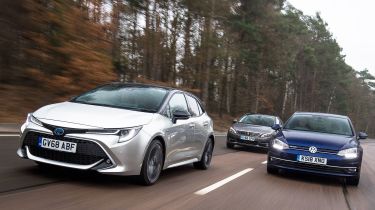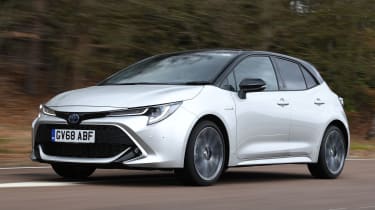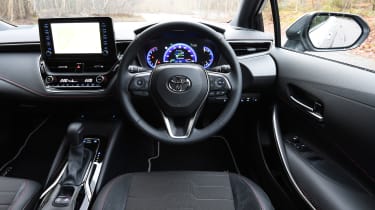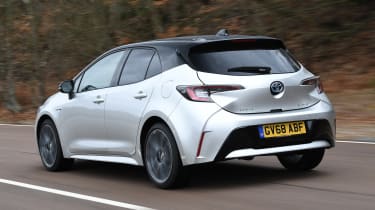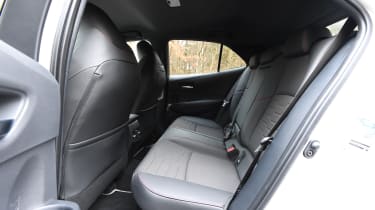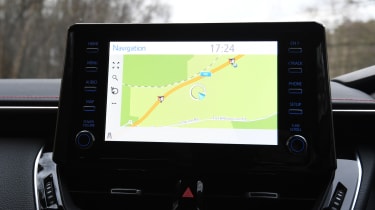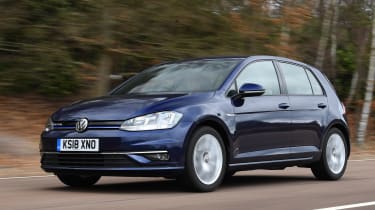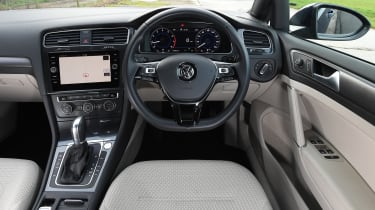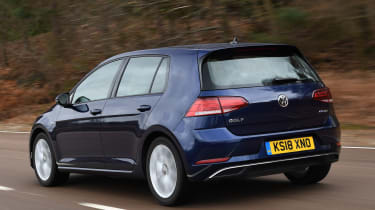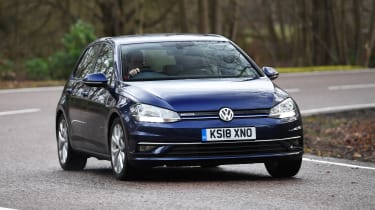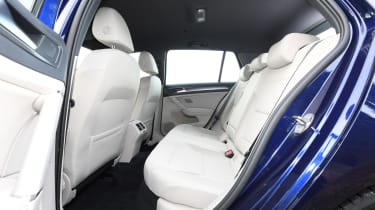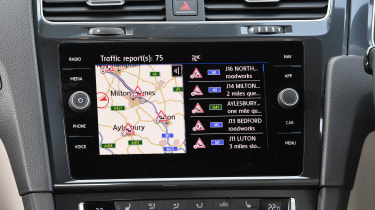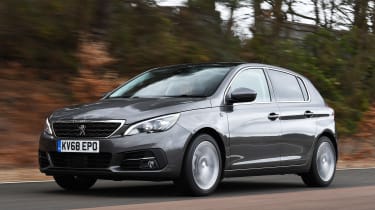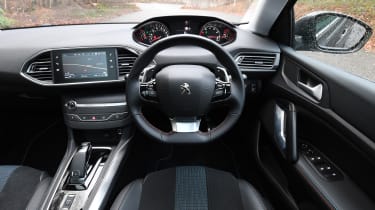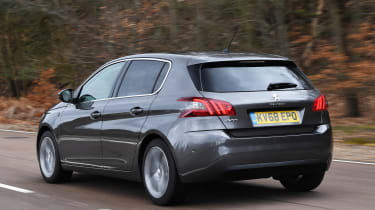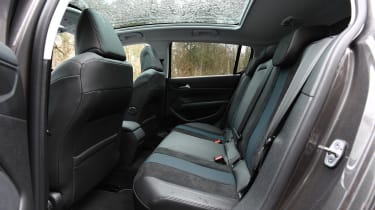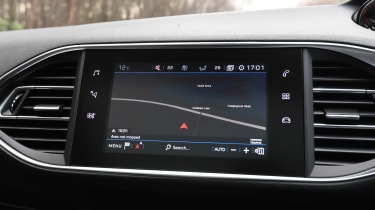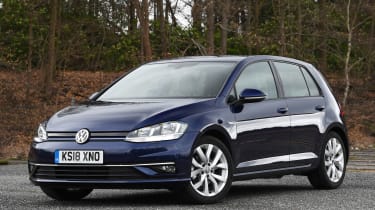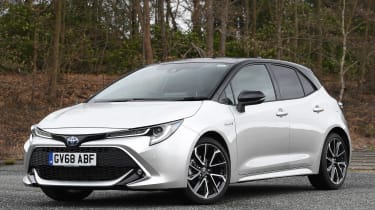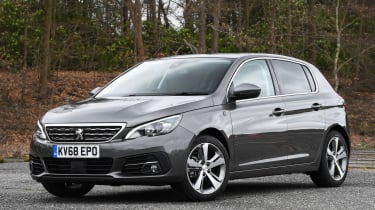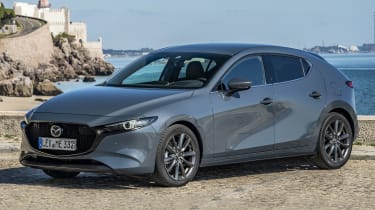Toyota Corolla vs Volkswagen Golf vs Peugeot 308
We see if Toyota’s new British-built Corolla can put up a fight against rival family hatches from VW and Peugeot
Car manufacturing in the UK is facing an uncertain future, but there’s still some good news around, and Toyota’s brand new Corolla family hatch is one such success story. The model is built at the Japanese firm’s plant in Burnaston, Derbyshire.
It replaces the Auris in the maker’s line-up, another product that was produced here in the UK, but Toyota has opted to return to the name that has sold more cars than any other.
Despite using an older nameplate, it’s an all-new car featuring modern hybrid engine technology. The Corolla is available as a hatchback, estate and saloon, and it’s the former we’re testing here, because it will be the most popular with British buyers. Yet its success will depend on how well it matches up to its key rivals.
The Volkswagen Golf and Peugeot 308 we’ve lined up here are strong contenders in the hatchback class, offering families plenty of space and comfort in an efficient package for not much money. Topping the class, the VW is the car to beat here, because it offers the best mix of abilities. But the Peugeot’s appeal runs deep, too, with impressive versatility, fuel economy and tech to rival the Golf.
Used - available now

2022 Toyota
Corolla
22,057 milesAutomaticPetrol1.8L
Cash £15,799
2022 Toyota
Corolla
33,932 milesAutomaticPetrol1.8L
Cash £14,900
2022 Toyota
Corolla
23,990 milesAutomaticPetrol1.8L
Cash £16,663
2022 Toyota
Corolla
18,880 milesAutomaticPetrol1.8L
Cash £18,363However, can this sharp new Corolla match its competitors in terms of practicality, comfort, efficiency and equipment?
Toyota Corolla
| Model: |
Toyota Corolla 1.8 Petrol Hybrid Excel
|
| Price: | £27,345 |
| Engine: | 1.8 4cyl petrol/electric motor, 120bhp |
| 0-60mph: | 11.4 seconds |
| Test economy: | 44.3mpg/9.7mpl |
| CO2: | 83g/km |
| Annual road tax: | £130 |
Toyota’s dedication to hybrid power continues with its newest model, the Corolla. We’re testing the £27,345 1.8-litre hybrid version in Excel trim, but is it a match for conventional rivals?
Design & engineering
The new Corolla’s striking design might remind you of the C-HR or even the latest Prius. All of these models sit on the Toyota New Global Architecture (TNGA) platform, which is designed to integrate electrification at its core. This set-up also has a focus on body rigidity and lightness. It uses MacPherson struts at the front and a multi-link rear axle, so the suspension is more sophisticated than the 308’s, and matches the Volkswagen’s.
The powertrain is another point of difference. There’s a 1.8-litre petrol engine linked to an electric motor for a total output of 120bhp, which is sent to the front wheels through a CVT automatic gearbox. Unlike the Golf’s dual-clutch box and 308’s torque converter, this continuously variable transmission doesn’t have gears, and instead constantly adjusts engine revs to maximise power or efficiency, depending on what you ask of it with the throttle.
Toyota calls the Corolla a ‘self-charging’ hybrid, which simply means it can’t be plugged in.
The interior doesn’t have the visual flair of the Peugeot’s, and there are more cheap-looking, cheap-feeling plastics (for example, the cup-holders) than in the Golf. Yet build quality is impressive and the layout looks more modern than in other Toyotas.
While it’s pricier than its rivals here, the Corolla does have more equipment as standard. Excel gets 18-inch alloys, along with parking sensors and a reversing camera, adaptive cruise control, heated leather seats, sat-nav and a digital dial display.
Driving
You notice the difference in the powertrain compared with its rivals’ units from behind the wheel, but there are positives and negatives to this set-up. At low speed it runs quietly in EV mode, although it’s not long before the small battery needs to be topped up by the petrol engine, which chimes in and out smoothly. It means the Corolla is great in traffic, where the lack of engine noise and the electric motor’s assistance make progress calm and relaxed.
That continues as you leave congestion behind, because the 1.8-litre engine is well insulated from the cabin and refinement is very good. If you demand a burst of acceleration the CVT gearbox brings revs up in a slightly unpleasant way, much like every other gearbox of this type. Yet this is among the best CVTs we’ve tried, keeping revs as low as possible in order to maximise refinement and economy. It’s obvious Toyota has worked hard at trying to improve the connection between car and driver, because there’s less of the surging feel usually associated with CVTs.
The hybrid powertrain provides enough punch initially, but performance ebbs away thereafter as the lethargic 1.8-litre engine takes over acceleration duties. In our tests it posted a 0-60mph sprint time of 11.4 seconds, 2.6 seconds slower than the Golf and 1.6 seconds behind the 308. This isn’t the biggest issue if you drive to keep economy high, but the Corolla isn’t much of a driver’s car as a result.
That’s a real shame because the Toyota’s chassis is impressive. It’s very comfortable, soaking up bumps with composure and taking hard road surfaces in its stride, while also keeping body roll to a minimum. Ignoring the powertrain, the Corolla is almost as good to drive as the Golf, although its steering feels more disconnected than the Volkswagen’s.
Practicality
The Toyota’s hybrid powertrain necessitates a battery, which eats into interior space. The boot is 361 litres with the rear seats in place; that’s smaller than the Golf’s 380 litres and the 308’s large 470-litre load bay. It’s only 19 litres down on the VW’s, so there’s enough room for family life, but you might have to get creative with slotting in suitcases if you’re heading on holiday.
The rear doors are quite small and bulky, so it’s not as easy to get in and out of the Toyota as its rivals. However, once you’re inside, leg and headroom are good, and even with the front seats set back, adults will still feel comfortable, because the seatbacks are soft enough to rest your knees on.
It does fall behind for overall space and it’s darker in the back as well, due to the small, tapered rear windows. You do get a cup-holder in the doors, which is useful, but otherwise storage is only average.
Ownership
Even though it costs more than its competitors on test, the Corolla offers the most safety kit. While a reversing camera is £340 in the Golf, it’s standard in the Toyota, and similarly, autonomous braking is included here, but costs £400 on the 308. You also get seven airbags, lane-keep assist, traffic sign recognition and adaptive cruise control fitted as standard.Toyota’s five-year, 100,000-mile warranty is great, too, but the brand’s 12th place out of 26 marques in the manufacturers’ chart of our Driver Power 2018 owner satisfaction survey was only average.
Running costs
The hybrid Corolla returned a fuel economy figure of 44.3mpg on our test, which was ahead of the Golf’s 41.9mpg and the Peugeot’s 38.5mpg returns.
Low CO2 emissions of 83g/km put the Toyota in the 19 per cent Benefit-in-Kind tax bracket for company car users, so lower-rate earners will only pay £1,033 a year to run one. That’s less than the £1,174 and £1,243 it will cost for the Volkswagen and 308 respectively.
Testers’ notes: “You’ll need to adapt your driving style to get the most from the Corolla’s powertrain, but once you do and use the battery and electric motor, you’ll maximise economy, which should cut costs.”
Volkswagen Golf
| Model: |
Volkswagen Golf 1.5 TSI 130 DSG GT 5dr
|
| Price: | £25,740 |
| Engine: | 1.5-litre 4cyl petrol, 128bhp |
| 0-60mph: | 8.8 seconds |
| Test economy: | 41.9mpg/9.2mpl |
| CO2: | 113g/km |
| Annual road tax: | £140 |
The Volkswagen Golf is our favourite family hatch and therefore the model to beat here. The 128bhp 1.5-litre petrol TSI version in GT trim is the highest spec available with this comparable engine to the Toyota for power, although it’s not a hybrid.
Design & engineering
This Golf uses petrol power alone. The 1.5-litre TSI turbo delivers 128bhp and 200Nm of torque to the front wheels through a seven-speed dual-clutch auto box. Some GT models also have lowered suspension over the standard car, but our 128bhp version features the normal set-up.
It sits on the MQB platform, which underpins many different VW Group models, so there’s strut suspension at the front, and while some versions use a torsion beam, this car features a multi-link set-up at the rear to match the Corolla.
The Golf’s interior is simple and functional, but it’s also well built and uses soft-touch materials that make it the most upmarket model of the trio. Adding to the classy image is the excellent infotainment system. The eight-inch set-up is the most modern-looking here and it’s standard on the GT (although the car in our pictures is an SE Nav). It includes smartphone connectivity which, sadly, is not yet offered on the Corolla.
You can also add a 12.3-inch TFT Active Info Display digital dashboard for £495. This is larger than the Toyota’s seven-inch set-up and replaces the traditional analogue dials behind the wheel.
In addition, GT spec includes upgraded upholstery, ambient lighting, selectable driving modes and adaptive cruise control. However, some features that are standard on the Corolla, such as a reversing camera and LED headlights, are optional (at £340 and £995 respectively). Even so, add these extras and the Volkswagen still works out cheaper.
Driving
The Golf gets each aspect of the driving experience just right, which is why it’s one of our favourite cars.
For a start, it’s quiet and calm inside even at high speed, and the suspension soaks up lumps and bumps in the road surface adequately enough. Only occasionally does it bounce abruptly. At least body control is great, which makes it enjoyable on a twisty country road as well, since it remains tied down even over rough tarmac.
Steering is direct, while there’s also plenty of grip. The Golf isn’t the finest driver’s car in this class – mainly because of its numb steering – but it is the best here.
The engine is quiet, smooth and punchy, thanks to its 200Nm of torque from as low as 1,400rpm. It took 8.7 seconds to go from 30-70mph through the gears, due in part to its dual-clutch gearbox. The Corolla was quite a bit slower, completing the same test in 11.7 seconds, while the eight-speed Peugeot managed the 30-70mph test through the gears in 9.8 seconds, splitting its two competitors.
VW’s hatch was quicker than both of its rivals in gear as well, because it went from 30-50mph in just 3.8 seconds. The Corolla took 4.4 seconds using full throttle (it doesn’t have gears to directly compare here), while the 308 posted a time of 4.3 seconds.
The DSG transmission shifts smoothly, although it does sometimes struggle to choose the correct gear in traffic and stop-start situations in town.The gearbox does mean that, unlike the Corolla, you don’t need to work the engine hard to add speed, since the torque is produced low in the rev range, so the box doesn’t need to shift down.
Practicality
This is one of the VW’s strong points, because the Golf is roomy inside and there’s lots of head and legroom in the rear. The doors open wide, and large door bins, a big glovebox and a deep cubby between the front seats mean in-car storage is good, too. There’s also a place to put your phone ahead of the gearshifter, although access to the USB port is tricky.
While the Golf’s 380-litre boot isn’t as spacious as the 470 litres you’ll find in the Peugeot, it’s still big enough for the vast majority of family uses with the rear seats in place, and it’s still a bit larger than the Toyota’s luggage area. There’s a variable-height floor, which means you can swap between having a little extra boot space or a smaller loading lip.
Ownership
EURO NCAP awarded the Golf five stars and the model has extra safety tech now compared with when it was first tested. All cars get seven airbags and autonomous braking with pedestrian detection. GT models feature adaptive cruise control and parking sensors, but a reversing camera is £340 and lane-keep assist and blind spot warning are part of option packs (the lowest-priced pack to bring the former is £55, the latter £1,120).
Volkswagen scored highly in our Driver Power 2018 poll, finishing fifth overall in the manufacturer section. That was ahead of Toyota and Peugeot, which were 12th and 17th respectively out of 26 brands.
Running costs
The Golf’s 41.9mpg return on test was in between the Toyota and the Peugeot, and it’ll manage 461 miles on a single tank.
Estimated residuals are okay, at 41.7 per cent after three years, but the Toyota’s 44.1 per cent figure is a little higher. Both beat the Peugeot’s 39.9 per cent. Our experts predict that the Golf will be worth £10,734 after 36 months, a loss of £15,006. It should be worth more than the 308, at £10,003 (losing £15,067), but the Corolla trumps both rivals because it will be worth £12,059. However, the pricey Toyota actually loses the most cash, at £15,286.
Testers’ notes: “There are plenty of engines and trim levels to pick from in the Golf’s wide range. We’d also consider a downsized 1.0-litre model, or even a 2.0-litre diesel, depending on how you plan to use the car.”
Peugeot 308
| Model: |
Peugeot 308 PureTech 130 EAT8 GT Line
|
| Price: | £25,070 |
| Engine: | 1.2-litre 3cyl petrol, 129bhp |
| 0-60mph: | 9.8 seconds |
| Test economy: | 38.5mpg/8.5mpl |
| CO2: | 124g/km |
| Annual road tax: | £140 |
The Peugeot 308’s sharp styling means it competes with the Corolla for the attention of buyers. This 1.2-litre petrol auto in GT Line trim costs £25,070, so it’s the cheapest car here, but you’ll need to add optional extras to match the Toyota’s kit list.
Design & engineering
Peugeot’s 308 is based on the versatile EMP2 platform, which also underpins the 3008 and 5008 SUVs, and even the larger 508 saloon. At the front it uses pseudo-MacPherson struts, while at the back there’s a de-formable crossmember (torsion beam). It’s a less sophisticated set-up than in either rival here, because they have multi-link set-ups.
The 308 also features a three-cylinder engine, but don’t think that having one less cylinder than the VW and Toyota puts it at a disadvantage; the 1.2-litre unit is the most powerful on test, producing 129bhp and 230Nm of torque. There’s also a traditional torque- converter automatic gearbox, with eight ratios.
Peugeot calls its interior design ‘i-Cockpit’, and that means there’s a divisive driving position and tiny steering wheel, with the dials positioned just above instead of behind it. The layout works for some drivers, but not others. Material quality is a little way behind the Golf’s, and about on par with the Toyota on the important touch points.
The main benefit of i-Cockpit is that all models get a 9.7-inch touchscreen display right in the middle of the dashboard, because it’s the only way to control things such as the air-conditioning and radio. It comes with Apple CarPlay and Android Auto, and you even get satellite navigation included.
Dual-zone climate control is also standard, and if you go for the GT Line model we’re testing here (although our pictures show a Tech Edition), it also brings 18-inch alloy wheels, live traffic updates, LED headlights, leather-effect seats, parking sensors and a reversing camera.
Driving
The Peugeot’s engine provides punchy performance, and thanks to its three-cylinder layout, it has an entertaining exhaust note as well. At the track the motor helped it to sprint from 0-60mph in 9.8 seconds, which was 1.6 seconds faster than the Corolla and one second behind the Volkswagen.
Our in-gear tests showed that it performs well in the higher gears, thanks to its extra ratio. The 308 took 7.4 seconds to go from 50-70mph in fifth, 0.3 seconds faster than the Golf. While the Corolla can’t be compared directly due to its CVT box, at full throttle it covered 50-70mph in 7.2 seconds.
A kerbweight of 1,204kg makes the 308 the lightest model here, which partly explains its strong performance, but this lightness has benefits to ride and handling as well. The Peugeot rides smoothly for the most part, but its chassis is more shaken by harsh bumps, especially mid-corner. The Corolla and Golf both have more composure here.
But the French hatchback’s quick steering and small steering wheel mean it turns in sharply, and there’s enough grip to support that. The steering has a more satisfying weight than the Golf and Corolla’s set-ups, but it’s similarly devoid of feedback, while the other models’ composure over rough roads means they ultimately inspire more confidence on a country route than the Peugeot. It’s close, though; all three cars score highly for ride and handling.
Practicality
Fold the rear seats down and the 308 has more space than both rivals, with 1,309 litres available. But the difference in reality isn’t vast, and all three models will have enough room for a typical trip to Ikea, for example.
Most owners will use the boot with all the seats in place, and the 308 has the edge here as well, because its boot volume is 470 litres, well ahead of its rivals’ capacities; it’s here where the spacious Peugeot shines.There’s not much trade-off in the back seats, either, because you get a good amount of head and legroom in the rear. Still, the Golf has a bit more space and has more accommodating seats as well. The Corolla’s rear-seat space is about on par with the 308’s, but the French model is a little easier to get in and out of because the doors open wide.
Ownership
In our Driver Power 2018 satisfaction survey Peugeot finished 17th in both the manufacturer and dealer categories, which is toward the bottom of the table and a disappointing result for the brand.
Toyota ranked 12th and third respectively in our annual poll, while Volkswagen came in fifth overall out of 26 in the makers’ chart, but its garages trailed in 18th place out of 28 marques.
The 308 also drops behind its rivals for safety kit, because autonomous emergency braking is £400 as part of the Drive Assist pack, which also adds adaptive cruise control (both are standard on the other cars). You have to pay for lane-keep assist as well; this is included with the Corolla, but the Golf also misses out on this technology as standard.
Running costs
The Peugeot 308 managed a poor 38.5mpg on our test, which places it well behind the Toyota and VW for economy. At current fuel prices, that works out at an annual petrol cost of £1,700 in the 308, while the Golf will set you back £1,562 and you’ll spend £1,478 a year at the pumps with the Corolla.
Our example insurance quotes demonstrated that the Golf will be the cheapest car to insure here. Our numbers show an annual premium of £416 for the 308, £510 for the Toyota and just £397 for the VW.
Testers’ notes: “The Peugeot’s EAT8 automatic gearbox is smooth, but it’s not as fast as the Golf’s dual-clutch unit. It does keep revs lower than the CVT in the Toyota, because it can use the engine’s low-down torque.”
Verdict
First place: Volkswagen Golf
The Golf is a stand-out winner in the family hatchback class because it’s such a fine all-rounder. It’s comfortable, good to drive, practical and economical – all key areas for most buyers looking for this type of car. But its strengths go even further than that, because it’s also great value, has a superb infotainment system, is quiet, refined and roomy in the rear. It’s little wonder why the VW is one of Britain’s best-selling cars.
Second place: Toyota Corolla
For ride and handling, the Corolla is close to the best in class. The chassis is fun but comfortable, and while keen drivers will find the powertrain frustrating, it’s yet another improvement with greater refinement than before. If relaxation is a priority and you want to maximise economy, the Toyota is a top choice, and while Excel trim is pricey, low running costs mean it’s a better pick for many buyers, despite poor infotainment tech.
Third place: Peugeot 308
The 308 drops behind its rivals because of its slightly lumpy ride and poorer economy. It’s well equipped and has the biggest boot here, but it’s not an order of magnitude more practical than the others, plus other foibles such as quality, the driving position and infotainment hobble it. There are positives, though, including its entertaining, punchy engine, smooth gearbox and decent refinement.
Coming soon
Mazda 3
Model: Mazda 3 GT Sport AutoDue: Mid 2019 Price: £25,895Engine: 2.0-litre 4cyl, 120bhp
Mazda's new 3 will offer clever tech called SkyActiv-X that promises diesel-like running costs from a petrol engine. For now, only a mild-hybrid petrol is available, although our early impressions were positive.
| Volkswagen Golf 1.5 TSI 130 DSG GT 5dr | Toyota Corolla 1.8 Petrol Hybrid Auto Excel | Peugeot 308 PureTech 130 EAT8 GT Line | |
| On the road price/total as tested | £25,740/£26,895 | £27,345/£28,360 | £25,070/£25,070 |
| Residual value (after 3yrs/36,000) | £10,734/41.7% | £12,059/44.1% | £10,003/39.9% |
| Depreciation | £15,006 | £15,286 | £15,067 |
| Annual tax liability std/higher rate | £1,174/£2,348 | £1,033/£2,067 | £1,243/£2,485 |
| Annual fuel cost (12k/20k miles) | £1,562/£2,604 | £1,478/£2,463 | £1,700/£2,834 |
| Ins. group/quote/road tax cost | 16/£397/£140 | TBC/£510/£130 | N/A/£416/£140 |
| Cost of 1st/2nd/3rd service | £297 (2yrs) | TBC | £199/£249/£179 |
| Length/wheelbase | 4,258/2,620mm | 4,370/2,640mm | 4,253/2,620mm |
| Height/width | 1,492/1,799mm | 1,435/1,790mm | 1,457/1,804mm |
| Engine | 4cyl in-line/1,498cc | 4cyl & e-motor/1,798cc | 3cyl in-line/1,199cc |
| Peak power/revs | 128/5,000 bhp/rpm | 120bhp/5,200rpm** | 129/5,500 bhp/rpm |
| Peak torque/revs | 200/1,400 Nm/rpm | 142Nm/3,600rpm^^ | 230/1,750 Nm/rpm |
| Transmission | 7-spd auto/fwd | CVT auto/fwd | 8-spd auto/fwd |
| Fuel tank capacity/spare wheel | 50 litres/space saver | 43 litres/repair kit | 53 litres/space saver |
| Boot capacity (seats up/down) | 380/1,270 litres | 361 litres/N/A | 470/1,309 litres |
| Kerbweight/payload/towing weight | 1,280/500/1,400kg | 1,295/525/750kg | 1,204/636/1,400kg |
| Turning circle | 10.9 metres | 10.6 metres | 10.4 metres |
| Basic warranty (miles)/recovery | 3yrs (60,000)/1yr | 5yrs (100,000)/1yr | 3yrs (unlimited)/1yr |
| Driver Power manufacturer/dealer pos. | 5th/18th | 12th/3rd | 17th/17th |
| NCAP: Adult/child/ped./assist/stars | 94/89/65/71/5 (2012) | TBC | 92/79/64/81/5 (2013) |
| 0-60/30-70mph | 8.8/8.7 secs | 11.4/11.7 secs | 9.8/9.8 secs |
| 30-50mph in 3rd/4th | 3.8/4.9 secs | 4.4 secs (kickdown) | 4.3/5.4 secs |
| 50-70mph in 5th/6th/7th/8th | 7.7/10.1/13.6s/N/A | 7.2 secs (kickdown) | 7.4/8.9/13.0s/N/A |
| Top speed/rpm at 70mph | 130mph/2,400rpm | 112mph/N/A | 127mph/2,000rpm |
| Braking 70-0/60-0/30-0mph | 48.8/35.2/10.3m | 50.3/38.0/9.6m | 44.3/34.4/8.9m |
| Noise outside/idle/30/70mph | 70/52/64/71dB | N/A/N/A/64/74dB | 71/43/63/74dB |
| Auto Express econ. (mpg/mpl)/range | 41.9/9.2/461 miles | 44.3/9.7/419 miles | 38.5/8.5/449 miles |
| WLTP fuel consumption (med) | 44.8-46.3mpg | 55.3-62.7mpg | 41.6-48.5mpg |
| WLTP fuel consumption (med) | 9.9-10.2mpl | 12.2-13.8mpl | 9.2-10.7mpl |
| Actual/claimed CO2/tax bracket | 156/113g/km/23% | 147/83g/km/19% | 239/124g/km/25% |
| Airbags/Isofix/park sensors/camera | Seven/y/y/£340 | Seven/yes/yes/yes | Six/yes/yes/yes |
| Auto box/lane keep/blind spot/AEB | Y/£550*/£1,120*/y | Yes/yes/no/yes | Y/£500*/£400*/£400* |
| Clim ctrl/cruise/leather/heated seats | £425/ad./£1,900/£400^ | Y/adaptive/y/y | Y/y/£1,200*/£1,200* |
| Metallic/LEDs/keyless go/pwr tailgate | £580/£995/£375/n | £1,015/yes/yes/no | £545/yes/£350/no |
| Nav/digi dash/DAB/connected apps | Yes/£495/yes/yes | Yes/yes/yes/yes | Yes/no/yes/yes |
| Wireless charge/CarPlay/Android Auto | No/yes/yes | No/no/no | No/yes/yes |
